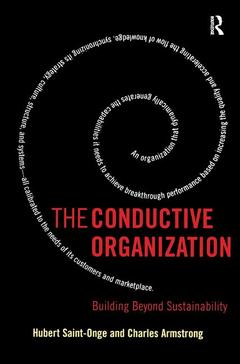The Conductive Organization Building Beyond Sustainability

An organization's culture lies at the heart of its ability to perform. In the knowledge economy, new rules are emerging and organizations must rethink how they will compete by leveraging their tacit knowledge - their intangible assets - in order to create and sustain a strategic advantage. In this book, Hubert Saint-Onge and Charles Armstrong, two corporate leaders who have been in the forefront of using knowledge management to gain strategic advantage, focus on knowledge-based customer relationships, innovative internal structures, and self-initiated learning cultures, in order to explain the building blocks that must be in place to create and sustain a knowledge-based culture within organizations?a culture that they argue is integral to a high-performance organization.
An organization's culture lies at the heart of its ability to perform. In the knowledge economy, new rules are emerging and organizations must rethink how they will compete by leveraging their tacit knowledge - their intangible assets - in order to create and sustain a strategic advantage. In this book, Hubert Saint-Onge and Charles Armstrong, two corporate leaders who have been in the forefront of using knowledge management to gain strategic advantage, focus on knowledge-based customer relationships, innovative internal structures, and self-initiated learning cultures, in order to explain the building blocks that must be in place to create and sustain a knowledge-based culture within organizations?a culture that they argue is integral to a high-performance organization.
This book provides a blueprint for creating and leading organizations with strong knowledge-based cultures to achieve breakthrough performance. Using the idea of conductivity, the authors describe the successful organization of the future as one that increases the quality and flow of knowledge within the organization and within its network of suppliers, customers, and other collaborators. The narrative is based on the thoughts, experience, and models of Hubert Saint-Onge and Charles Armstrong, who have successfully led high-performance companies in the financial services sector and the engineering and manufacturing sector. Each chapter includes practical examples from their experience and from other successful leaders.
Chapter 1: The Conductive Organization
Chapter 2: The Customer Imperative
Chapter 3: The Knowledge Capital Model
Chapter 4: Customer Calibration
Chapter 5: Strategy Making
Chapter 6: Internal and External Branding: The Character of the Conductive Organization
Chapter 7: Culture: The Collective Mindsets of the Conductive Organization
Chapter 8: Structure: The Custodians of Conductivity
Chapter 9: Systems: Generating Capabilities
Chapter 10: A New Leadership Agenda
Chapter 11: From Conductive to Highly Conductive - The Evolving Organization
Glossary
Figures
Date de parution : 01-2017
15.2x22.9 cm
Date de parution : 05-2004
Ouvrage de 224 p.
22.9x15.2 cm
Mots-clés :
knowledge; era; organizational; capability; key; capabilities; achieving; breakthrough; performance; customer; Conductive Organization; Membership Services; Organization Employee Relationship; Integral Organizational Capabilities; Stru Ctu; Business Processes; Knowledge Capital Model; Key Organizational Capabilities; Achieve Breakthrough Performance; Core Organizational Capabilities; Knowledge Flow; Customer Capital; Knowledge Era; Customer Dialer; Customer Calibration; Customer Cluster; Knowledge Team; Capability Practice; Knowledge Strategy; High Performance Culture; Leadership Development; Organizational Capabilities; Hr Function; Brand Promise; Knowledge Network Map



